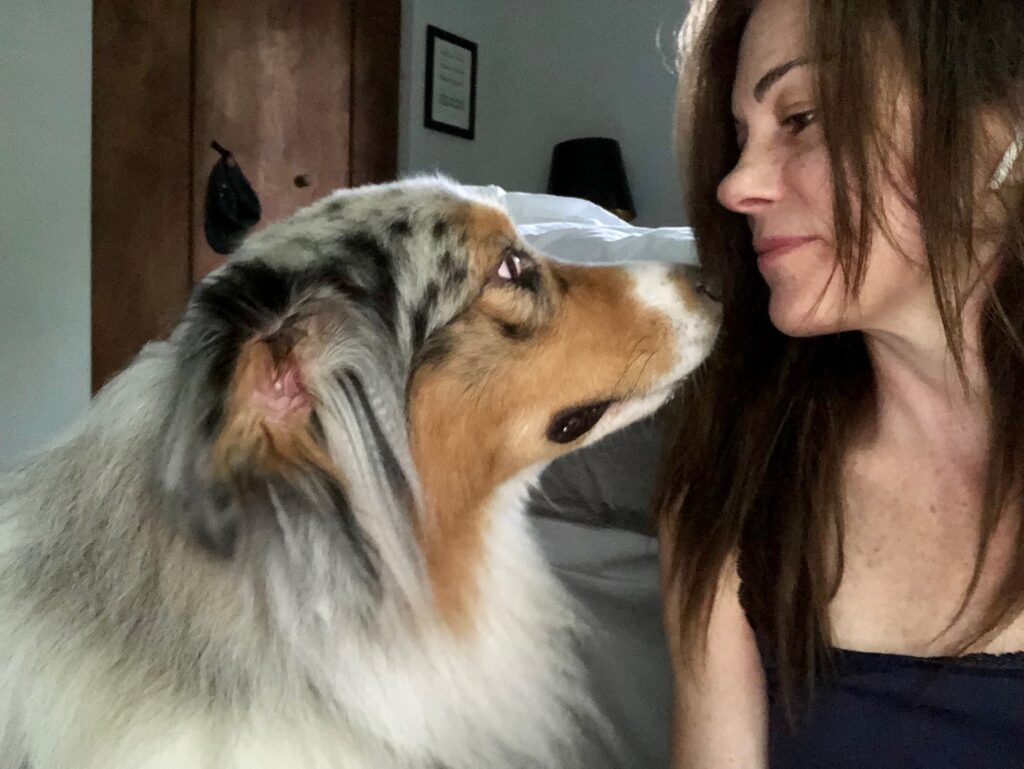
IT’S 8 A.M. ON A SATURDAY and I just finished walking my ex’s dog—though really, the dog walked me. Hiker (named by my boys) is a 1-year-old Australian shepherd with a level of energy and purpose that I was not, at that early hour and with coffee in hand, equipped to match. When I grew tired of being tugged up the street and instead tried to pick up the pace and jog with him for a minute, his herding instincts kicked in and he zigzagged in front of me, determined to keep me in line. I tried to find humor in how absurd that must have looked, but mostly it was just annoying.
We are on day 6 of these morning walks, Hiker and me. My ex and his new wife return from their honeymoon in a couple days, when I’ll gratefully resume my usual morning routine of not holding a bag of poop in my hands as Hiker pulls me around my own neighborhood. But I’ll miss it. As we do with things that become part of us for a time.
The trick is to know that everything always is.
It’s been three years since I walked a dog with any regularity. The day after Mother’s Day in 2019 is when we lost Sadie, the beloved pitbull-chow mix we’d had for 16 years. That morning my ex and I met at the vet’s office to huddle on the floor of the small, sterile room and whisper to her our most sincere thanks and love as the benevolent poison coursed through her veins and our sweet girl slumped down for the last time, her old bones given their final rest. She was 94 in human years, but what’s a human year, anyway? The older I get, the less it seems like a true measurement of time. I lived a decade this week alone—and not only because of Hiker’s rambunctiousness.
When the news broke of the devastation in Uvalde, Texas, I doom-scrolled Twitter for several minutes, trying to ascertain what was happening. Two children dead, some reported. Then “Fourteen are dead.” Which was correct?? I switched over to the Associated Press news site I have bookmarked. Their headline listed two deaths, and I breathed something like a sigh of relief, but not quite. Back on Twitter, more people were confirming 14 dead. You cannot trust social media, I reminded myself. Twitter is not news. I closed that tab and went back to the AP site, refreshing the page. “Two dead” changed to “Fourteen” before my eyes, and I lost it. No no no no no!
Not this. Not again.
Kostyn was in kindergarten when 20 first-graders were massacred at Sandy Hook Elementary in Connecticut. Back then, I’d stand in the front office of his elementary school every afternoon, sign my name on a pad of paper and wait expectantly for my little boy to come bounding in with a red Angry Birds backpack on his tiny shoulders and a big smile on his face. The possibility of him not coming through that door—the agony of me leaving without him on an otherwise ordinary afternoon—had never occurred to me until that terrible day.
That weekend I wrote a thank you letter to his teacher that was forwarded to other teachers at Kostyn’s school. I watched the president cry on TV, and it made me cry harder but also feel better somehow. Shared pain hurts differently, it hits a more cathartic spot. I’m guessing that’s why we gather to grieve in funeral homes, why we post mournful public Facebook messages addressed to people who are no longer even here to read them.
I also think that’s why I kept going back to Twitter this week—though never for too long. It’s a delicate balance, the need to stay informed but not to ruminate. To stay soft enough to bend into the mourning but also hard enough to demand accountability, change, some other way of being as a society. Because this shit is broken. My kindergartner is now finishing his freshman year of high school, and the only thing that’s changed is him.
As the news of 14 dead children soaked into my soul the day it happened, I had one thought: I want to call Mom. For no reason, really. She can’t fix it. Hell, half the time I’m only on the phone with her for three minutes before I am driven completely nuts by something she says. But still, I wanted to share it with her, this outpouring of love welling in my chest for strangers, and this despondency in my mind over the state of things. I guess in a moment of pain, I want to hear the voice I’ve heard longest, the one that echoes loudest. And I am keenly aware, as my mom lives with an inoperable, malignant brain tumor and my dad lives with Alzheimer’s, that the day will come when I will swear I’d give anything in the world to hear those voices say my name one more time.

Dinner was steaming on the table, but my boys—safe and sound—were not back from their walk around the neighborhood. I stepped outside, sat down on my front steps and called her. Mom hadn’t heard the news yet. She and Dad were sitting on their front porch talking about the flowers, the neighbors, the weather. So I had to tell her what had happened. She relayed the tragedy, sentence by sentence, to my father. “Oh my god,” she said to both of us. “Oh my god. And right after Buffalo? Another elementary school??” Another. “I don’t know how parents do it in this day and age, let their kids go to school and just hope for the best.”
“Mm” was all I could muster.
There was a beat of silence as she remembered I am one of those parents. “Makes you think maybe your sisters are right to homeschool,” she said. [I’d guess this was about three minutes into our conversation…]
“Yeah, maybe,” I said. “But we all go to the grocery store.”
THE NEXT MORNING, the boys and I were on our way to their school when I saw a dog that looked exactly like Sadie. It hadn’t happened in awhile, me coming across a pit-chow mix like that. Her brindled coat, her curly tail and muscular frame … there she was, right down the road being walked by some stranger. I did a double take as we turned right out of our neighborhood and away from the ghost of my favorite dog. “Oh my gosh you guys, look at that dog! It looks so much like Sadie!”
Kostyn and Evan craned their necks and agreed in amazement. I cried quietly as I drove, partly missing my old pup and partly because seeing that dog made me realize something that I inexplicably said out loud: “Oh man, someday that’s gonna happen to me but with one of my parents,” I mumbled, tears streaming. “I’m gonna see some sweet old guy who looks like my dad, or says something just like him, or is wearing a hat like his, and–” Kostyn cut me off with a gentle hand on my arm. “Mom! Why would you do that to yourself??”
“I don’t know!” I said in an exasperated tone, trying to lighten the mood. I reached across him and grabbed a napkin out of the glove compartment to catch my tears, and we changed the subject. A few minutes later I dropped them off at school, reminding myself that, statistically speaking, they’re safer in there than they were in my car. It didn’t make me feel better.
By Saturday morning, I felt utterly overwhelmed by it all. Uvalde. Ukraine. COVID numbers rising again. My ex remarried—that news is good but still … weird. I sat down to write something—I didn’t know what yet—but Hiker didn’t want me to. He kept nudging my arms and sniffing around my legs, all drippy tongue and gross dog breath. His belly fur was damp with morning dew. I set the laptop aside and snapped a couple pictures of him, and us. He has differently colored eyes—one is clear white and the other’s mostly brown, but there’s a little brown in the white iris and a little white in the brown one.

“You have yin-yang eyes,” I told him, then burst into tears. Overcome by it all. At that moment, my boyfriend, Tim, called to say good morning. Clearly startled by my shaky greeting, he asked what was wrong. At first I said, “I don’t know.” Because the answer was nothing and so many things, all jumbled together now. I could not say “I miss my dog, and we’re handing our kids a broken world, and 21 homes down in Texas have been turned into open wounds, and my parents in New York will not live forever, and the terrible truth of life is that it always just goes on even when parts of it suddenly don’t.”
I couldn’t say all that, of course, so I didn’t. But he was concerned and asked again, so I summed it up: “I’m just grieving.”
“Grieving over what?” he prodded gently. “Something you’ve lost, or something you will lose someday?”
I hesitated for several seconds. “Yes,” I managed, finally.
I WISH I HAD YIN-YANG EYES, the ability to see with every glance the interconnectedness of everything, the way life is always striving for a delicate balance. Because lately everything feels imbalanced. Precarious. Fragile. Finite. Even though I know it isn’t. Even though I know that we are all, at our core, One Thing, that we share history, energy and destiny. I know that I am reading news accounts of this tragedy from afar but also, I am part of it. It is us. I am the child bleeding out on the classroom floor, and I am the parent bent over with grief at her kitchen sink, and I am the gunman, lost and broken and without enough barriers put up by society to minimize his destruction.
I am the child, and this fills me with sorrow.
I am the parent, and this devastates me to my core.
I am the gunman, and this sickens me, that I have not done more to use the voice I have to save people like him and to save people from him. I vote for leaders who say they will. I give money to those who do the lobbying for common sense laws—but only, if I’m being honest, after a tragedy, after the mourning and anger move me to act in order to cauterize the guilty wound inside my own heart. It is not enough.
I tried to explain to Tim, through my tears, all that I’m grieving.
“It’s up to us to do what we can,” he said, and my mind left Uvalde and flashed instead to the tiny baby bunny Tim had brought to my house a week before.
He’d accidentally mowed over a nest of baby bunnies earlier in the day at a large commercial lot his lawn care company is contracted to care for. The carnage had devastated him. Much later that afternoon, he’d noticed a teeny infant bunny sitting paralyzed on the pavement. For hours, the palm-sized creature didn’t move. Finally finished with the job as dusk was turning rapidly to dark, Tim had to make a decision.
“Leave it alone,” everything on the internet said. But he couldn’t. The parent was nowhere to be found, and he couldn’t leave this defenseless one to chance that something big and hungry wouldn’t get it overnight. So he scooped it up in his sweatshirt and, instead of heading home after a 14-hour work day, stopped at the store for Kitten Milk Replacer.
I watched from my couch as he sat with it in his hand, trying to nudge some much-needed nourishment into that miniscule mouth using an eye dropper. The bunny wouldn’t take anything. I fetched him a small box from my garage and an old towel, and we made the soft little thing a makeshift nest. Tim gingerly placed the box on the passenger seat of his big work truck and the two of them headed home. I was so nervous he’d wake to find it dead.
The next morning he sent me a text: “Bunny’s doing great! He ate this morning! Going to take him back and hopefully find his mom.”
The mother was sitting near where the nest had been. Tim set her baby down in the grass and left. He was sure the two reunited quickly, though he wouldn’t allow himself to go back later and check. I kind of wanted him to, but he said he knew that if the baby was still there, he’d be tempted to take it back and keep him.
He said that he needed to trust that he’d done what he could, and respect that he is not in control.
I must try harder to do the same.

